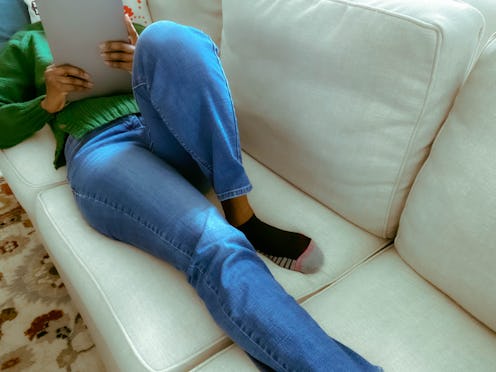Life
Experts Explain What Happens To Your Period After Being At Home For What, 4 Weeks?

Whether you’re staring down your first week of social distancing or your fourth, if you get a period, you'll probably deal with one at some point during the coronavirus pandemic. You know that stress can make your period funky. What about being cooped up at home for the unforeseeable future?
"Social isolation, loneliness, change in exercise all reflect the psychological effects of COVID-19, the common denominator of which is acute traumatic stress," Dr. Kecia Gaither, MD, MPH, FACOG, an OB/GYN and director of perinatal services at Lincoln Medical Center, a New York City hospital, tells Bustle. Dr. Gaither says that producing too much cortisol and corticotropin releasing hormone (CRH) can mess with ovulation, which in turn can lead to longer or shorter menstrual cycles, no period, or super painful periods.
The mechanics at work are these: Your pituitary gland tells your ovaries to release estrogen and progesterone (and a few other hormones) at different times of the month. That controls whether you ovulate or menstruate. If that system is disrupted at any point, then your menstrual cycle can get thrown out of whack. (One important point: If you're on hormonal birth control, none of this applies because the level of hormones in your body will stay the same.)
For example, if you're playing Animal Crossing until 4 a.m. every night, that could be a drastic enough sleep change to throw off the delicate hormonal dance your ovaries play every month.
“When the master clock of the circadian rhythm is disturbed by timing of sleep or lack of sleep, there is a reduction in the production of melatonin and an increase in inflammation in the body," Dr. Felice Gersh, M.D., founder and director of the Integrative Medical Group of Irvine, tells Bustle. "Melatonin has receptors on the ovary and a reduction in melatonin production can block ovulation.”
Self-declared introverts and extroverts alike have been feeling extra lonely since we’ve had to cut out all socializing that doesn’t include a screen as a mediator. And loneliness, in addition to being an emotional bummer, can also affect levels of cortisol, aka the stress hormone. A rise in cortisol can interrupt the regular hormonal cycle that your body needs to have a regular period.
Long story short, you might notice some changes in your menstrual cycle during social isolation. (You also might not! Every body is different.) If you track your cycle as your main form of birth control, it's a good idea to use a backup method until you know whether or not you're on track. You might also want to stock up on hydrogen peroxide to get out any unexpected blood stains. Other than that? When your period comes, grab the hot water bottle and be thankful that, this month as least, you don't have to go outside.
Experts cited:
Dr. Kecia Gaither, MD, MPH, FACOG
Dr. Felice Gersh, MD
This article was originally published on